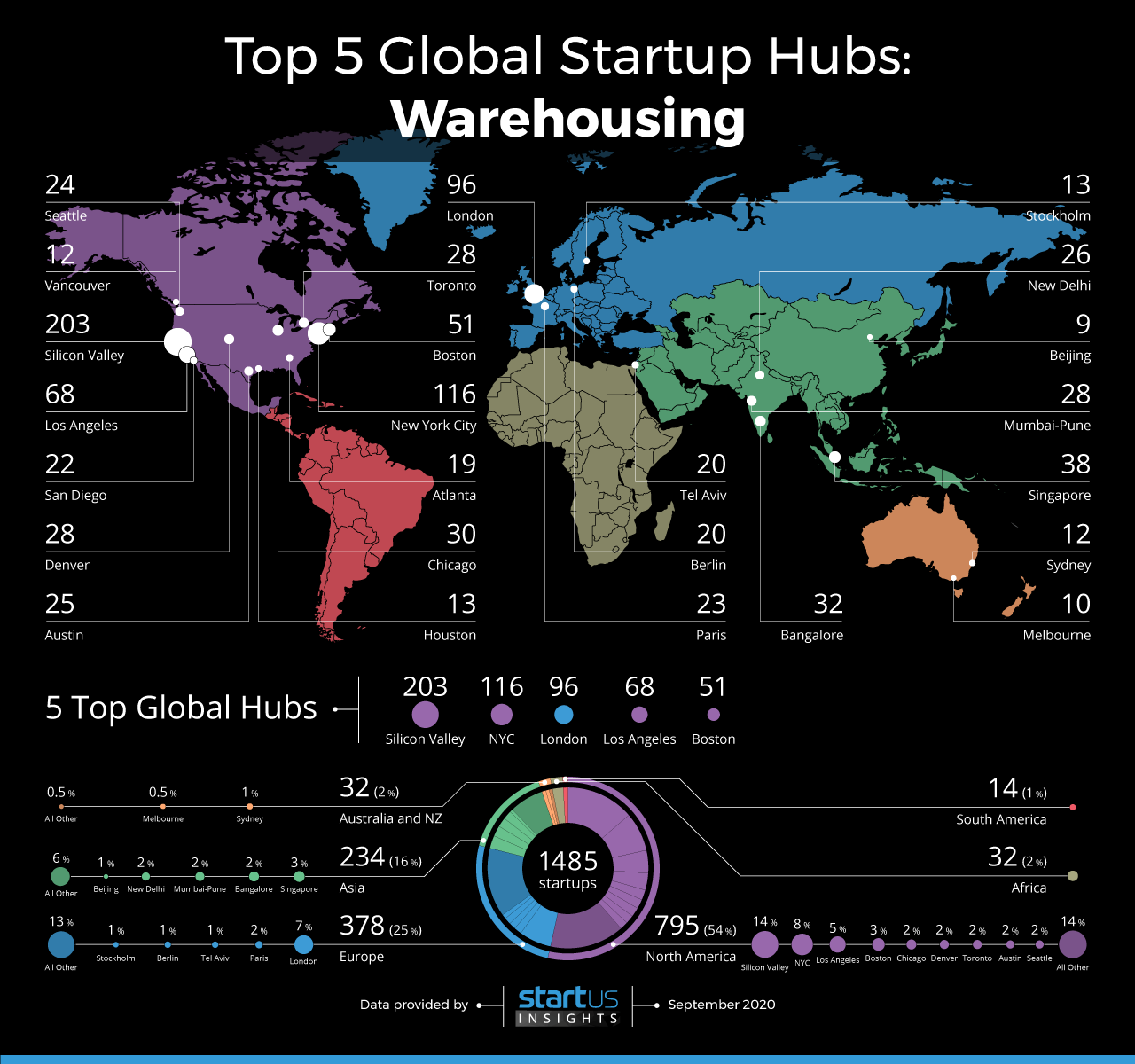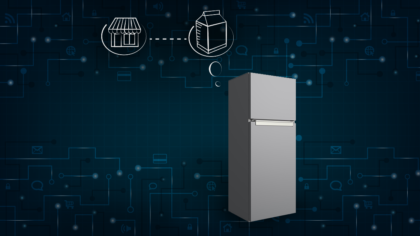Accelerate Productivity in 2025
Reignite Growth Despite the Global Slowdown
Warehousing is the storage of goods for sale or distribution at a later time. It allows manufacturers to serve their customers when demand is greater than supply, as well as hold on to the product when demand is lower. As space becomes a premium commodity across global hubs, and to address labor shortages, innovations in warehousing are a must to keep with the growth in commerce, especially eCommerce. In addition to cameras, warehouses and storage facilities today are equipped with a range of smart solutions, such as climate control, automation, and warehouse management systems (WMS). These solutions enable businesses of all scales to access quality storage at affordable prices and, in turn, faster delivery times and greater customer satisfaction.
Top 5 Global Startup Hubs: Warehousing
Using our StartUs Insights Discovery Platform covering more than 1.379.000 startups and scaleups* globally, we analyzed the geographic distribution of global activity in the warehousing sector. We identified 42 regional hubs* that observe high activity in developing technology-driven solutions across the sector like automated warehousing, on-demand warehousing, and eGroceries to name a few.
Within these hubs, we analyzed a sample of 1.485 startups and scaleups employing technology-driven solutions to innovate in the industry. Silicon Valley, New York City, London, Boston, and Los Angeles are home to 534 startups and scaleups and account for 36% of global warehousing activity. Let us have a look at some of the innovative solutions from these 5 top hubs.
Based on our analysis of a sample of 1.485 startups & emerging companies, we observe that North America is home to 54% of global activity in the warehousing sector. Several large warehousing hubs in the US are powered by the growth in eCommerce and moving in of large manufacturers.
European warehousing hubs in London, Paris, Tel Aviv, Berlin, and Stockholm account for 25% of global activity. Emerging Asian warehousing hubs in India and Singapore lead the region’s activity in the sector.
1. Silicon Valley: 203 Startups & Scaleups
Silicon Valley startups are known for disrupting the logistics and supply chain industry with technologies such as artificial intelligence (AI), big data, drones, robotics, and the Internet of Things (IoT). Innovations from the region are making warehousing smarter, rather than just increasing capacity and scale. As startups from sectors such as automotive and energy move into the area to test their ideas and attract tech talent, there is a need for warehousing solutions that specifically meet their needs.
Nimble Robotics is a San Francisco-based startup that develops robotics solutions for logistics & supply chains. It uses a proprietary supervised autonomy technology that allows teleoperators to assist robots in handling stock-keeping units (SKUs). The solution enables pick and place, sorting, and packing operations for cost-effective and efficient fulfillment workflows.
2. New York City: 116 Startups & Scaleups
Warehouses are attracting a lot of investment in New York City, with them growing faster than offices and apartment buildings. The trend is primarily fueled by competition among eCommerce retailers to stock their goods closer to urban customers. Companies also offer warehousing as a service to make it more affordable for new startups and small businesses.
New York-based startup Unioncrate offers a platform that serves the warehousing and supply chain needs of the consumer and packaged goods (CPG) brands. The platform packages solutions for both demand planning and operations management. It provides inventory forecasts and optimal safety level prediction across multiple warehouses. This helps reduce dead stock and spoilage, as well as storage costs.
3. London: 96 Startups & Scaleups
The increase in warehousing demand in London is primarily due to a growth in online retail and a resurgence of manufacturing in the UK. As the amount of land available becomes a potential bottleneck, startups are innovating in warehousing to support the growth of the logistics industry. To efficiently serve the warehousing needs of different industries, such as automotive, retail, and food, solutions offer a range of sizes and warehouse types, including multi-story warehouses.
As space becomes a premium commodity, new solutions utilize different types of locations for storage. Stashbee is a London-based startup that develops a platform to connect individuals and businesses looking for spare space with those who have it. The storage spaces come in a range of sizes and varying monthly rents to meet any storage requirement. The startup verifies the hosts and insures the space to make it a worry-free experience for its customers.
4. Los Angeles: 68 Startups & Scaleups
Los Angeles’ airports and the seaport handle a large fraction of cargo imported into and exported from the US. This naturally makes the city in southern California a global hub for the warehousing sector. In recent years, the growth of tech-based industries has also increased the demand for warehousing land. Startups are exploring both locations near these entry points and closer to customers to provide customers an omnichannel experience.
Los Angeles-based startup MasonHub provides warehousing solutions for retail eCommerce. It offers reliable omnichannel fulfillment for brands that store their goods in MashonHub’s warehouses. The solution allows full tracking and visibility into the inventory to help brands ship quickly and affordably. The startup also offers returns management, transfers across stores, and rate shopping.
5. Boston: 51 Startups & Scaleups
Boston is well-known for being a global hub for robotics talent that serves multiple industries. For the warehousing sector, startups and companies are looking for ways to use robotics to automate warehouse operations. In particular, there is a special focus on order fulfillment, with services such as micro fulfillment making warehousing both more affordable and closer to the customer.
Takeoff Technologies is a Boston-based startup that offers micro fulfillment services to grocers. It enables local grocers to integrate automated fulfillment within their businesses. The flexible and scalable solution makes the transition to eGrocery profitable while providing a hyperlocal experience to the customers.
What’s next?
As eCommerce continues to grow, global hubs will continue to add warehousing capacities, as well as innovate to make it more efficient. With a growing population, more land will be needed for housing, further straining the land available for warehouses. To meet the increasing demand, startups and companies are working on smart warehousing solutions to get the most out of every square footage.
*We define a hub as the regional geographic center of activity for this topic. It covers the center point with a radius of 100km. For this report, we define startups and scaleups as those founded after 2010.








